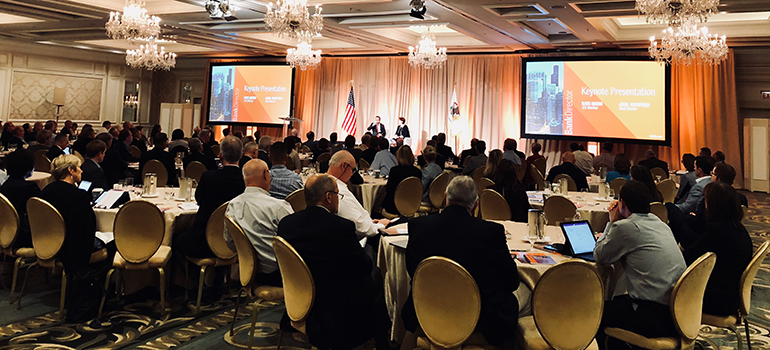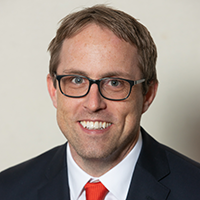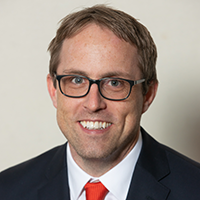
One Thing That Will Make You a Better Bank CEO
 There’s a reason great leaders also tend to be better than the average Joe and Jane at forecasting the future. As multiple conversations with participants on the first day of the 2018 Bank Board Training Forum in Chicago reveal, effective leadership and accurate predictions seem to derive from the same underlying trait.
There’s a reason great leaders also tend to be better than the average Joe and Jane at forecasting the future. As multiple conversations with participants on the first day of the 2018 Bank Board Training Forum in Chicago reveal, effective leadership and accurate predictions seem to derive from the same underlying trait.
For a long time it was believed that forecasting was about as accurate as throwing darts at a dartboard with a blindfold on. It’s common knowledge and running joke, after all, that economists have predicted nine out of the past five recessions.
But a growing body of research, spearheaded by Philip Tetlock, the Annenberg professor at the University of Pennsylvania’s Wharton School of Business, has found not only that some people are better at forecasting than others, but also that certain traits make some better at predicting the future than others.
What’s that important trait?
Tetlock refers to it as perpetual beta—“the degree to which one is committed to belief updating and self-improvement.” In other words, if you’re dedicated to constantly learning and accumulating knowledge, chances are you’ll be better at predicting the future than an ordinary person.
Perpetual beta isn’t just slightly more important than other traits; it’s vastly more important. “It is roughly three times as powerful a predictor as its closest rival, intelligence,” Tetlock wrote in his book Superforecasting: The Art and Science of Prediction.
This is interesting in and of itself, but what makes it more interesting is this idea of constant improvement and knowledge accumulation also happens to be one of the most robust commonalities of great bankers.
Bank Director CEO Al Dominick noted this in his opening remarks at this year’s training forum, when he talked about the three traits of top bank boards. No. 2 was cultivating curiosity—embracing a learner’s mindset.
It was also a theme that coursed through the keynote conversation with Katherine Quinn, vice chairman and chief administrative officer of U.S. Bancorp, the fifth-largest commercial bank in the country and long one of the best-performing companies in the industry.
Quinn took it one step further, connecting the dots between diversity, knowledge and decision-making. The more diverse your employee base is, she explained, the wider the spectrum of ideas your organization will be exposed to, making it more likely you’ll arrive at the optimal solution to whatever issues you need to address.
The connection between constant learning and effective leadership was also a point that Tom Brown, the founder and CEO of Second Curve Capital, a hedge fund that invests in publicly traded financial services companies, made in a conversation on the sidelines of this year’s training forum.
Brown would know. Walk into the corner office of most superregional or major money center banks and the chances are good that, at one time or another, he has been there.
So, how do you pursue knowledge and get others in your organization to follow suit? You have to read—a lot. It sounds simple, but it’s incredibly powerful.
Asked once for advice on how to become a successful investor, Warren Buffett, the chairman and CEO of Berkshire Hathaway, pointed to a stack of papers: “Read 500 pages like this every day. That’s how knowledge works. It builds up, like compound interest. All of you can do it, but I guarantee not many of you will do it.”
You’ll hear the same thing from other extraordinary bankers.
Michael “Mick” Blodnick, the former CEO of Glacier Bancorp, the second best-performing bank of all time based on total shareholder return, spent years staying up late reading about banking. And anyone who worked with Robert Wilmers, the late chairman and CEO of M&T Bank, the top-performing bank of all time, will tell you he was a voracious reader.
And it’s not just about reading either, a point Bank of America chairman and CEO Brian Moynihan made in a recent interview with Bank Director magazine, which will appear in the fourth quarter.
“Reading is a bit of a short-hand for a broader type of curiosity,” said Moynihan. “The reason I attend conferences is to listen to other people, to pick up what they’re talking and thinking about. It’s about being willing to listen to people, think about what they say. It’s about being curious and trying to learn. The minute you quit being educated formally your brain power starts to shrink unless you educate yourself informally.”
Ideas like this can sound trite—a point great CEOs will readily acknowledge—but after hearing it enough times from enough of them and you can’t help but conclude that what’s trite also often tends to be true.



